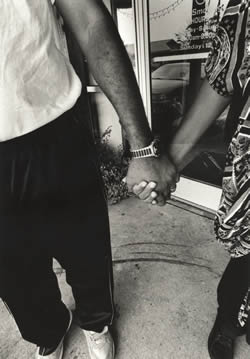Photo exhibit shows personal side of life after stroke
A black-and-white photography exhibit opening Thursday aims to increase understanding of life after stroke through art.
“Travels in Stroke Country” will be unveiled at 2 p.m. Thursday, May 19 in the Regional Rehabilitation Center at Pitt County Memorial Hospital.

The exhibit will be at the Regional Rehabilitation Center through the summer.
The event is open to the public. Light refreshments will be served. The exhibit is sponsored by the East Carolina University School of Allied Health Sciences and the Regional Rehabilitation Center at PCMH with support from the North Carolina Humanities Council.
A discussion on stroke and culture will be led by project organizers Dr. Heidi Kelley and her husband, Dr. Ken Betsalel, both of the University of North Carolina at Asheville, and Dr. Don Ensley of the ECU School of Allied Health Sciences.
The exhibit documents the journey of several stroke survivors including Kelley, who at age 41 suffered a massive stroke which left her completely immobilized. Kelley, now 47, has progressively improved and lives with expressive aphasia and wears a brace on her right leg. She is director of the Liberal Arts Learning and Disability Services and is an associate professor of anthropology at UNC-Asheville.
Kelley and Betsalel met Ensley and his wife, Ramona, also a stroke survivor, through the Tri-State Stroke Network, a coalition of health professionals concerned about the high rates of stroke in North Carolina, South Carolina and Georgia.
The current exhibit focuses on survivors who live in the “stroke belt,” which includes all of North Carolina, particularly the eastern part of the state.
Betsalel began using the camera more than 10 years ago to photograph his students’ community service learning projects. He is an associate professor of political science at UNC-Asheville. He also has used photography to capture the issue of homelessness in the Asheville area and to document Kelley’s anthropological field work in Spain.
“After Heidi’s stroke, we decided it was important to document and record her rehab and recovery,” Betsalel said.
Stroke has a powerful affect on survivors and their families, he said.
“It is as much about the nature of human relationships and love as it is about anything else,” he said. “Without connection with other people, we have found stroke survivors and co-survivors do not do as well. What we have learned and hope people come away from the exhibition with is that stroke, like other illnesses and resulting disabilities, is a part of life. And rather than keep these things out of sight, these are human experiences that we need to look at and learn from. As such, our project is about building strong and resilient communities, what Martin Luther King Jr. referred to as ‘beloved community,’ in which all are recognized with compassion and dignity.”
The exhibit will remain at the rehabilitation center through the summer. This fall, the photos will be moved to the School of Allied Health Sciences in the Belk Building.
Kelley and Betsalel brought a previous photography exhibit to ECU in 2003 titled, “Mind’s Fire, Selections from a Photographic Diary of Rehab and Recovery,” during the School of Allied Health Sciences’ 35th anniversary.